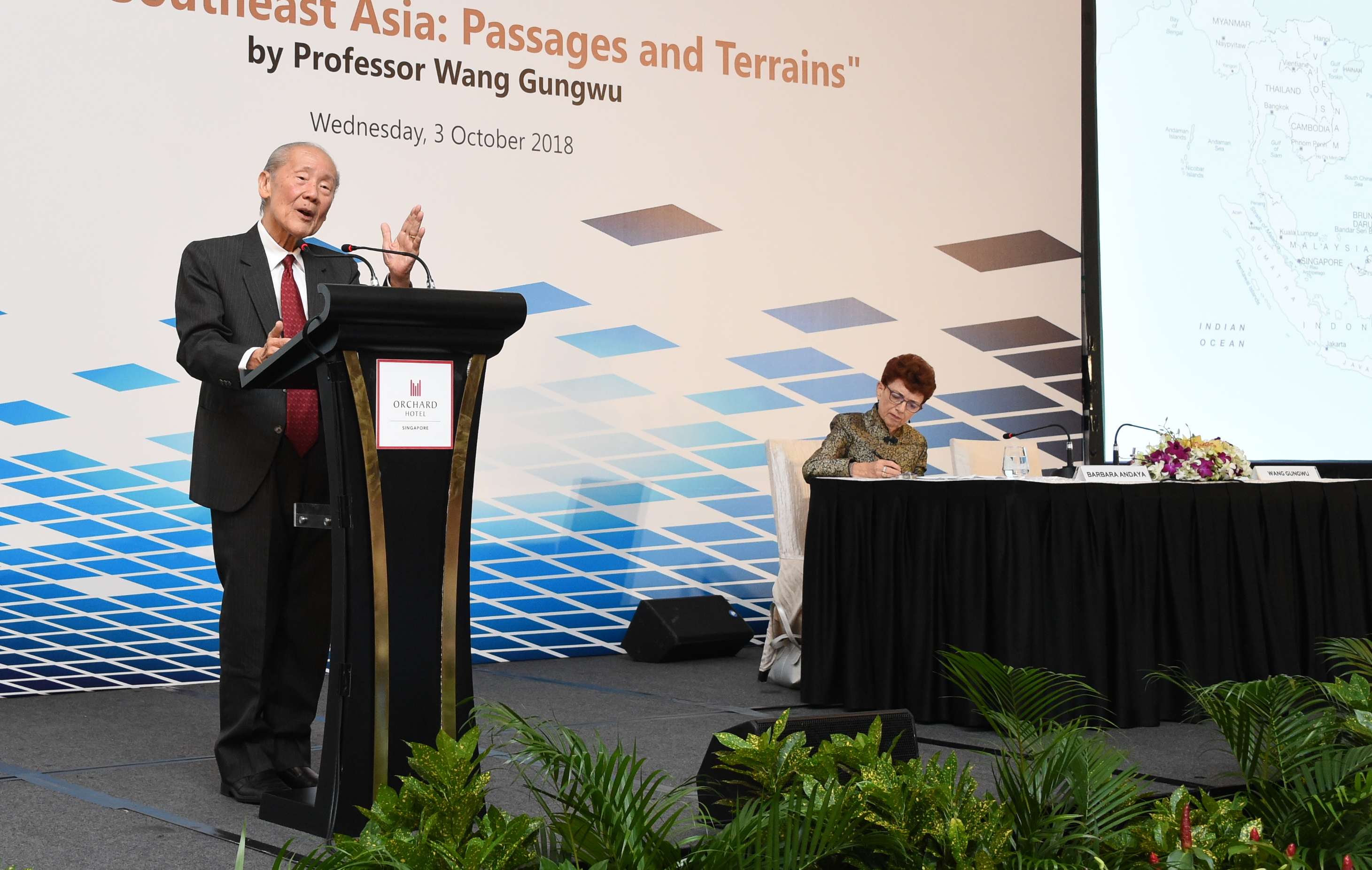China's Belt and Road Initiative (BRI) is not meant as a challenge to American hegemony, but is more for its own economic development and maritime interests, said historian Professor Wang Gungwu.
Wang made this comment in response to a question on China's intentions for the BRI during his lecture, "Before Southeast Asia: Passages and Terrains", held by the ISEAS-Yusof Ishak Institute on Wednesday, October 3.
[related_story]
While Wang could have given a quick answer, he delved into the past for a better understanding of the situation and ended up giving a nine-minute long answer.
BRI a response to a maritime world filled with American allies
Wang said the BRI was "probably a response" to how the maritime world were "all allies of the United States" from China's point of view:
"All the naval powers are American allies.
From Japan down to Australia, the naval powers are all allies of the United States. It's quite clear that they are in charge of the sea.
If the Chinese now want to use the sea freely like everybody else, it naturally would take an interest."
He said that while the Americans might see it as trying to "push them out of their hegemonic position", the Chinese see that they are surrounded by allies of the United States.
Therefore, to him, the BRI, which includes "all of Asia" and "in fact, all of Eurasia", is China's "infrastructural approach" towards such developments.
China and ASEAN
Wang said that the "South China Sea, the route to the Indian Ocean, as well as to the Pacific" became "vital" to its economic development.
And that the shift in its approach to ASEAN was a "complete turnaround from suspicion to hostility, and then to accepting completely".
He explained that while China was suspicious of ASEAN at the end of the Cold War for being "anti-communist", it had no other choice but to make peace with ASEAN for its own economic growth:
"It was in the context of America being the power in charge of everything, and China recognising that its economic development was dependent upon freedom of navigation, maritime trade.
In fact, without these, China's economy would not have been so advanced. China's economic development for the last 40 years was because it opened itself to the sea.
Their dependence now on maritime transport is greater than anyone would have expected from China a few decades ago."
Wang added that China made peace with ASEAN by recognising the organisation quickly after 1999 (when China initiated its "go out" policy), and signing an agreement with ASEAN in 2002 -- a decision he described as "remarkable" -- it was indicative of the country recognising the importance of having access to maritime trade routes for its own economic growth.
China wants no responsibility, just safety
Wang then said that while the United States wanted to be "responsible for everything" after the Cold War, China wants none of that responsibility.
Instead, what it wants is simply security:
"America may be global in its interests, but the Chinese, in my mind, would never be foolish enough to challenge that or only want that responsibility.
That is tremendous responsibility, and I don't think the Chinese want this.
But what the Chinese want is to be assured, safe, secure, in their part of the world."
China wants to defend its own maritime interests
Wang also touched on China's naval power, saying that when the Chinese started developing their navy, it was to defend their marine and economic interests, even though they "may have other aims as well":
"They cannot just depend on the United States to protect their interests. In fact, they don't trust the United States to protect their economic interests at sea.
To me, these are new factors that follow quite naturally from the fact that China's economic development is now based on maritime economy."
China regretted not thinking about the sea before
Wang said that in "traditional Chinese history", China was more concerned with the "Central Asian block, Russia, Mongolia, Tibet, Xinjiang and the Muslim world" when it comes to their defence and security.
However, while these areas dominated security documents and the archives, there was "hardly anything about the sea":
"And that's reflected in the Zheng He expedition, which after seven times back and forth on the Indian Ocean, came back and said, "No enemies out there! So why bother to spend so much money?"
They pulled back and they've regretted it ever since because enemies did appear at sea!
In fact, the Opium War showed the British a few ships could destroy the Chinese navy in a matter of a few months.
And a few decades later, the Japanese had a navy which destroyed the Chinese navy in a few months.
After all that, if they don't learn any lessons from that, they must be really stupid!
They have to have a navy. Otherwise, they would be completely helpless."
It's how you interpret it
Wang then ended his answer by saying that it boils down to how we interpret various factors that were "happening at the same time":
"The Americans interpret it as a challenge to hegemony, that's one thing.
The Chinese interpret is as defence of their coasts, their security, their maritime economic interests are protected, and can never be dominated at any time by the American navy or someone else at sea.
I think that's probably what the Chinese had in mind."
Top image via ISEAS-Yusof Ishak Institute
If you like what you read, follow us on Facebook, Instagram, Twitter and Telegram to get the latest updates.
